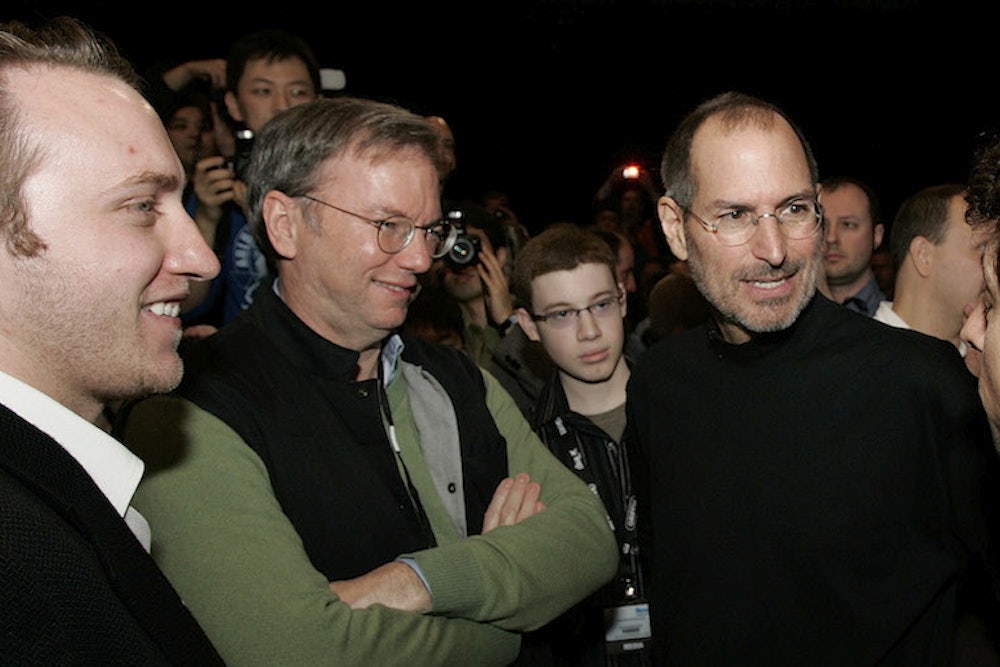Recently uncovered documents found that in 2005, Apple, Google, Intel, Adobe, Intuit, and Pixar started a coordinated effort to push down their workers’ wages. They agreed to not recruit employees from each other, they shared wage scales, and they made sure to enforce this agreement with each other. As Apple’s Steve Jobs told Google’s Sergey Brin, “if you hire a single one of these people that means war.”
Beyond the nauseating practices shown here by the digital, west-coast Masters of the Universe, this completely overturns the way we should understand how labor markets work. And, in turn, two pieces of information on display here can help explain a central story for why a higher minimum wage doesn’t kill jobs.
First, imagine you got an email from a friend saying that he or she found a new job, and they want to go and get drinks to celebrate. That would be pretty normal, and you’d likely agree. Now imagine the same friend just told you that they’ve bought some groceries in a supermarket, or sold their car to a dealership, and they want to go get a drink to celebrate. Here you probably would think something is wrong (and perhaps start investigating how to do a makeshift intervention).
Why is there a difference? From the simple way economists talk about labor markets, there’s none. The labor market is the same as the car is the same as the grocery store. There’s a clear market price, and you can buy and sell as much as you want at that price at any time.
But what your friend wants to celebrate is the completion of the job search. The first difference is that searching for a job takes time, energy, and frustration. Surveys consistently find that getting a new job is a major life event, in the way that buying and selling random goods is not.
We see this in the tech company scandal. This scandal couldn’t happen in the model of the labor market on display in the simple introductory Economics 101 view of the world, where workers have perfect information about job opportunities. The whole debate is over control of information of job openings. Who has them, what are they willing to pay, and how do they keep qualified candidates from finding them? In the jargon, the labor market is full of frictions, and it is even true in the high-tech labor market.
The second element is that when it comes to jobs, the employer picks the wages. Economists have spent forever trying to abstract away how wages are set, with stories about ethereal auctioneers, invisible hands, and the most mystifying metaphor of them all, “the market.” But, in general, you don’t write the salary you demand on your résumé. The boss makes an offer, and you either accept, refuse, or bargain at the margins.
We see this in the tech company scandal as well, with companies sharing salary data to make sure they weren’t offering high wages. As an Intel executive described it, “While we pay lip service to meritocracy, we really believe more in treating everyone the same within broad bands.” They couldn’t do this if an invisible hand dropped the salary bosses must pay workers out of the sky, the way they do in simple economic models.
The labor economist Alan Manning, in his book Monopsony in Motion (first chapter), argues that these two elements together means that employers have a small amount of market power over each job out there. This power is like a monopoly power, but the power doesn’t come from the size or concentration of the firm but instead from the difficulties of the search.
And this is where the minimum wage debates enter. There are a lot of vacancies and costly turnovers in low-wage work. Why don’t bosses pay their workers more to eliminate these undesirable phenomena? Because they’d in turn have to pay all the workers that increased amount, bidding up the cost of all their other labor—not dissimilar from the logic of Silicon Valley.
If a minimum wage forces low-wage employers to pay more in this way of viewing labor markets, a few things happen. Suddenly more people will search out the jobs in question, while other employees will be less likely to leave those jobs, both of which will increase employment. Because employers have the market power in setting wages, this also increases the relative bargaining power of workers.
If this theory is true, that means that vacancies and turnover in low-wage work should collapse as a result of a minimum wage increase. And that’s exactly what researchers Arindrajit Dube, T. William Lester and Michael Reich found in a recent study. Here the minimum wage doesn’t kill jobs. It kills job vacancies instead.
This isn’t the only way in which a higher minimum wage might not lead to lost employment. As the economist John Schmitt emphasizes, there are at least two other dimensions. It could be passed on through prices, leading to a one-off inflation that our weak economy should probably welcome. Or it could force managers to invest in their workers, increasing their productivity.
But it’s worth returning to Silicon Valley. The tech industry is supposed to be the height of the meritocratic labor market, with people’s pay matching effortlessly to their productivity and economic value. And even here we see the job market blanketed in uncertainty over job opportunities and pay, backed by employer power. Imagine how much worse those problems are in the high-stress labor market of the low-wage service economy, where the problems of information, transportation, survival and finances carry a much bigger burden for workers.
